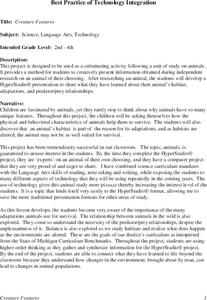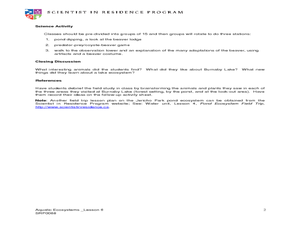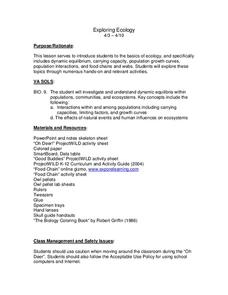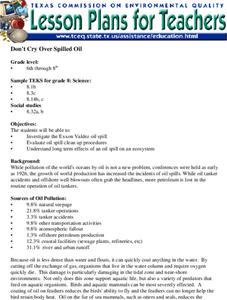Curated OER
Oh Panther
Students play a game that replicates the balance of prey and predators in an ecosystem. For this physical education lesson, students follow the instructions to play "Oh Panther!" Students collect data regarding the game and discuss the...
Curated OER
Creature Features
Students investigate animals and how they adapt to their environment. They design a multimedia presentation that includes information about an animal of their choice. They include a title card, habitats, adaptations, and a predator/ prey...
Curated OER
The Acetate Animal Hunt
Students determine which adaptations allow an organism to survive and reproduce in a certain environment. Students act as "predators" to pick up acetate discs "prey" scattered around the classroom. Students list the number found, the...
Curated OER
Spectacular Squid
Students study squid including what family they are in. In this exploratory lesson plan students view a video, answer questions and complete an activity on squid.
Curated OER
Spiders are Special
First graders recognize that spiders are important natural predators. They work in small groups with simple field guides to identify as many of their spiders as they can.
Curated OER
Animals: Vocabulary Quiz
In this vocabulary worksheet, students match words related to animals to their correct definition. Worksheet contains a link to additional activities.
Curated OER
Larva and Adult Antlion Body Parts
Students identify the major body segments of antlions. Through the use of diagram worksheets, students label the various body parts of the antlion. They review the life cycle of antlions from the larva stage to adult. Several activities...
Curated OER
Insect or Spider?
Students compare and contrast the difference between insects and spiders. After a brief class discussion, students complete an activity matching the body parts of an insect and the body parts of a spider. Worksheet with answer key is...
Curated OER
Eastern Screech Owl
In this screech owl worksheet, students complete activities to learn about screech owls after reading Screech Owl at Midnight by C. Drew Lamm. Students learn how to attract owls, investigate owls in their community, and define words...
Curated OER
Where Are The Dinosaurs?
Students study the existence of dinosaurs as a precursor to learning about extinction. In this dinosaurs lesson, students watch dinosaur video at assigned web sites. They discuss what they observed in the videos including how the...
Curated OER
Insect Food Chain & Camouflage
Students use art work to demonstrate their understanding of the insect food chain and their ability to camouflage themselves. In this insect food chain and camouflage activity, students determine what type of animals feed on insects....
Curated OER
Choose Your Defense: Spines, Vomit and Camouflage
Students investigate defensive mechanisms of insects and organisms. In this biology activity, students draw imaginary caterpillars as well as imaginary parasites that will harm the caterpillar. Students utilize the Internet...
Curated OER
Sand Tracks
Students examine the different markings animals make while walking through the sand. In an activity, the teacher hold up the same tracks individually and they must guess the animal who made them. They discuss the results as a class to...
Curated OER
Owl Pellets: A Fowl-Up, Chuck!
Students discover the world of owls as predators. After watching a video of owls hunting and eating, are introduced to owl pellets. Students dissect their own pellet and match the prey's bones to a bone diagram.
Curated OER
Escape! Survival of the Fittest Grasshopper
Fourth graders, in groups, design a paperclip grasshopper. They determine its ability to survive a prey by jumping high, far, or with a distracting behavior.
Curated OER
Sharks and Fishes
Learners explain the role of the school of fish as the prey and the shark as the predator, as they participate in the game Sharks and Fishes. They demonstrate quick physical movement, and trickery, by sucessfully staying away from the...
Curated OER
Habitat Is Home
Students are introduced to the concept and components of a habitat. They discuss the key components of a habitat and describe how certain factors can cause disturbances in a habitat and change its population. Activities are leveled for...
Curated OER
Burnaby Lake Field Trip
Students identify different organisms found in the lake ecosystem. In this life science instructional activity, students discover the predator-prey relationship through a game. They explain how beavers adapt to the environment over time.
Curated OER
Exploring Ecology
Pupils explore the basics of ecology through numerous hands-on and relevant activities. They participate in an online food chain demonstration, which explores food web dynamics. They dissect owl pellets, examine the prey's bones, and...
Curated OER
Don't Cry Over Spilled Oil
Middle schoolers study the Exxon Valdez Oil Spill while evaluating oil spill clean up activities. They discover the long term impact can have on an ecosystem by completing this experiment.
Curated OER
Camouflage and Protective Coloration: A Model of Natural Selection
Students collect data and compare whether protective coloration or camouflage provides better biological fitness in a given environment. They simulate predator prey interactions of two different species and use gene frequencies to...
Curated OER
Animals Spiral Puzzle
In this animal puzzle worksheet, students use a set of 8 clues about animals to complete a spiral puzzle. A reference web site is included for additional activities.
Curated OER
Mangrove Ecosystem
Eager ecologists explore ecosystems through video and photographs of a Mangrove. They discuss the animals in this habitat and how they interact with each other after reading and discussing "The Sea, the Storm and the Mangrove Tangle."...
Curated OER
Skulls Tell It All
Skulls tell it all, and with this lesson plan, you will tell it all to your class! Youngsters view animal skulls, analyzing the shape of teeth and the placement of the eye sockets. They associate these adaptations with the types of food...























